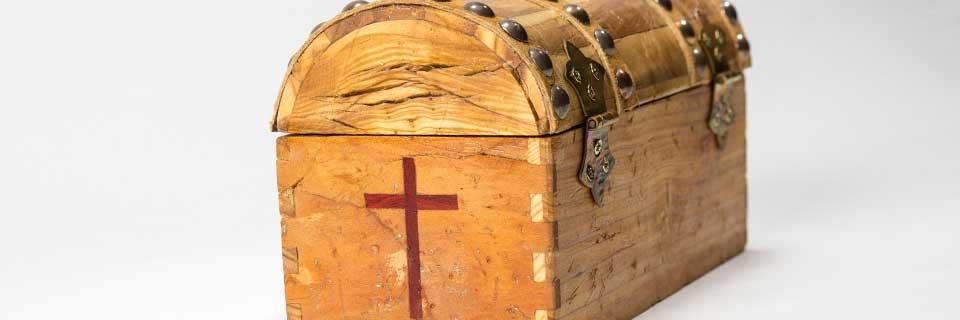Handmade Treasure Box Holds Wealth of Meaning

Andy Rondomanski of Rockhurst University’s Physical Plant wears a lot of different hats.
As a member of the maintenance team, he literally helps keep the lights on and the water running, among a host of other duties that keep the University humming. But even when he’s not fixing things around campus, Rondomanski has a lot of different hobbies to keep him busy — he’s a beekeeper, woodworker, gardener, amateur vintner, author of short fiction and cook, to name a few.
He often puts those hobbies to work making gifts for his family and friends — Rondomanski said he’s built small toys for nieces and nephews, a handmade wooden gift box for his mother, or bottles of his homemade fruit mead for friends.
This year, Rondomanski set out to build another small gift box — this time for University President the Rev. Thomas B. Curran, S.J. Given to Fr. Curran for Christmas, every detail of the “beat of nature” treasure chest Rondomanski built by hand seems carefully considered, the final result a true work of art.
“The idea of it just kept developing,” he said. “It all started coming back to me. All the lessons I learned as a kid, all the scriptures and parables.”
The sides are made of the cedar of Lebanon, said to be the same wood used by Solomon to build the first Temple. The lid is made of olivewood, a strong wood long used as a symbol of peace. The bottom of the box is made with 12 slats of wood from six different continents, with the middle slat made of olivewood from Bethlehem. On one side is a Star of David made of two different kinds of inlayed wood — one a bog oak radiocarbon dated to be 5,400 years old, the other ancient kauri, which comes from trees preserved by a peat swamp some 40,000 years ago. On the other side is a cross made of red-hued bloodwood, signifying Jesus’ sacrifice.
Inside are more even more meaningful pieces. Small silk pouches of gold, frankincense and myrrh represent the gifts of the wise men. A fishing net conjures Christ’s call for his apostles to become “fishers of men.” A container of mustard seeds, a clay lamp and two small mites encased in wood all refer to other Biblical verses. And another small wooden tray contains six salt shakers, each with colorful salt from a different part of the world. That, Rondomanski said, represents Fr. Curran, who he calls “salt of the earth.”
Given all of that, Rondomanski said constructing the chest was a time-consuming process, partially because he had to acquire millennia-old wood to build it and other materials to put inside. He said he sourced materials from online auctions; a shop near his home in Independence, Missouri, that specializes in rare hardwoods; and bits of other rare woods left over from other projects. But like many of Rondomanski’s hobbies, the process was a labor of love.
“I think that comes from my dad,” he said. “He taught us that we should keep busy with things that made us happy and always to love learning new things.”
In this case, he said he also wanted to make a different kind of Christmas present.
“I was tired of getting sweaters,” Rondomanski joked. “I wanted to make something that might touch a few people and have it bring to mind Christmas, and I thought ‘what could be a true Christmas gift?’ and that’s what I came up with.”
As for touching people, it seems it did accomplish that, as well — Rondomanski said shortly after Christmas, Fr. Curran had already shown the treasure box and its contents, to friends, family, his Jesuit peers, and used it as an example during a recent Mass.







